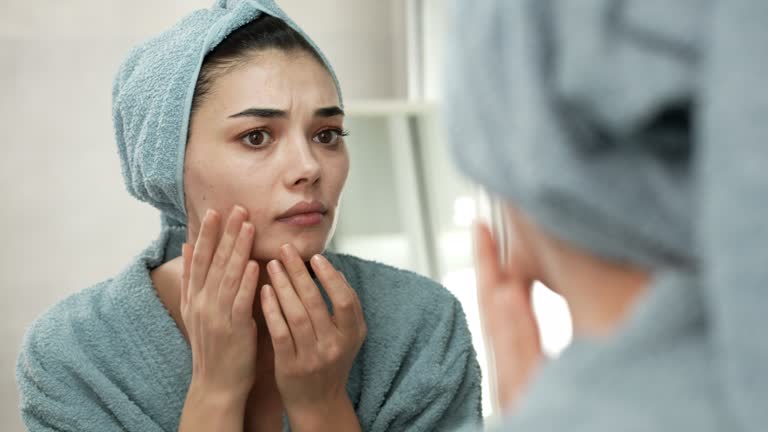Daily Skincare Routine for Folliculitis: A Beauticians Guide
Folliculitis is a common skin condition that affects many individuals, characterized by the inflammation of hair follicles. While it might seem minor, it can cause discomfort and affect the skin's appearance, which is particularly concerning for those in the beauty industry. As a beautician, understanding how to manage and advise on a daily skincare routine for folliculitis is crucial for helping clients maintain healthy skin.
Developing an effective routine requires knowledge of the skin's needs and how different skincare products interact with folliculitis. The aim is to soothe inflammation, prevent infection, and promote healing.

The Importance of a Consistent Skincare Routine
Maintaining a consistent skincare routine is vital for managing folliculitis. Consistency helps to regulate oil production, exfoliate dead skin cells, and prevent the clogging of follicles. Beauticians should emphasize the importance of daily care to their clients, as irregular routines can lead to flare-ups and prolonged healing times.
For those dealing with folliculitis, a simple yet targeted routine can make a significant difference. It involves cleansing, exfoliating, treating, and moisturizing with products suitable for sensitive skin. An effective daily routine not only alleviates symptoms but also boosts clients' confidence in their skin.
Step-by-Step Daily Skincare Routine
1. Gentle Cleansing
Cleansing is the cornerstone of any skincare routine. For individuals with folliculitis, using a gentle cleanser that does not strip the skin of its natural oils is crucial. Products with antibacterial properties, like those containing tea tree oil, can help reduce bacteria on the skin surface, minimizing the risk of infection.
Beauticians should recommend cleansing the affected areas twice daily, morning and night, to keep the skin clean without over-drying it.
2. Exfoliation with Care
Exfoliation helps to remove dead skin cells and prevent them from clogging follicles. However, it's important to choose products that are not too abrasive. Chemical exfoliants containing alpha or beta hydroxy acids can be effective without causing irritation.
Advising clients to exfoliate 2-3 times a week can enhance skin texture and prevent follicle blockage, which is essential for managing folliculitis.
3. Targeted Treatment
After cleansing and exfoliating, applying a treatment specifically designed for folliculitis can be beneficial. Look for products with ingredients like benzoyl peroxide or salicylic acid, which help to reduce inflammation and treat infections. These treatments should be used sparingly to avoid excessive drying of the skin.
Its important for beauticians to guide their clients on the appropriate use of these treatments to ensure they are effective without causing additional irritation.
4. Hydration and Moisturization
Moisturizing is a vital step in any skincare routine, especially for those with folliculitis. Using a non-comedogenic moisturizer helps maintain the skins barrier without clogging pores. Look for moisturizers with soothing ingredients like aloe vera or chamomile.
Encouraging clients to moisturize daily, even if their skin feels oily, can prevent dryness and support skin healing.
Additional Tips for Managing Folliculitis
Apart from the daily routine, there are additional measures that can help manage folliculitis. Advising clients to wear loose-fitting clothing and avoid shaving the affected area can minimize irritation. Additionally, recommending the use of warm compresses can help soothe inflammation and reduce discomfort.
For more in-depth information on this condition, consider visiting this comprehensive guide.

Common Questions about Folliculitis
As a beautician, being prepared to answer common questions about folliculitis can enhance client trust. Here are some frequently asked questions:
FAQ
1. Can folliculitis be cured?
While folliculitis can often be managed effectively, it may not always be completely curable, especially if caused by ongoing factors like shaving or tight clothing. Regular skincare and lifestyle adjustments can help minimize symptoms.
2. Is folliculitis contagious?
Folliculitis caused by an infection can be contagious. Its important to maintain good hygiene and avoid sharing personal items to prevent spreading.
3. Can diet affect folliculitis?
While diet is not a direct cause, maintaining a healthy diet can support overall skin health. Foods rich in antioxidants and omega-3 fatty acids may help reduce inflammation.
For further reading on related topics, you can explore [folliculitis and stress](https://livananatural.com/blogs/news/folliculitis-and-stress-related-conditions), [folliculitis and hormonal changes](https://livananatural.com/blogs/news/folliculitis-and-hormonal-disorders), and [folliculitis and thyroid disorders](https://livananatural.com/blogs/news/folliculitis-and-thyroid-disorders).
Incorporating these insights into your practice will not only enhance your service but also empower your clients to achieve healthier skin. Understanding and addressing folliculitis through a dedicated daily skincare routine can transform how clients perceive their skin, leading to better outcomes and satisfaction.

